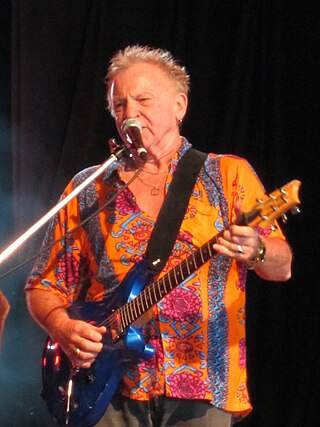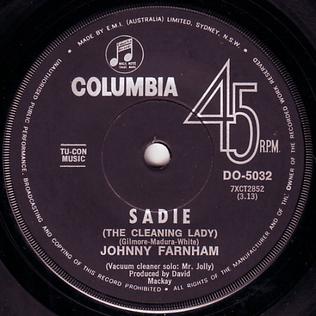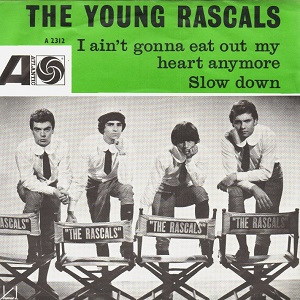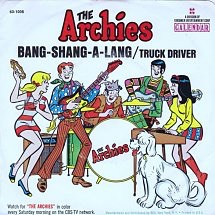Related Research Articles

Johnny Young is a Dutch Australian singer, composer, record producer, disc jockey, television producer and host. Originally from Rotterdam, The Netherlands, his family settled in Perth in the early 1950s. Young was a 1960s pop singer and had a number-one hit with the double-A-sided single, "Step Back" and a cover of the Strangeloves' "Cara-lyn" in 1966. Young's profile was enhanced by a concurrent stint as host of TV pop music program The Go!! Show. Also in the mid-1960s, Young toured with the Rolling Stones and supported Roy Orbison.

The Archies are an American fictional rock band featured in media produced by, and related to, Archie Comics. They are best remembered for their appearance in the animated TV series The Archie Show. In the context of the series, the band was founded by guitarist/vocalist Archie Andrews, drummer Jughead Jones, bassist Reggie Mantle, percussionist/vocalist Betty Cooper and keyboardist/vocalist Veronica Lodge. In the cartoons, Veronica is shown playing a large keyboard instrument styled after the X-66, a then-current top-of-the-line organ made by the Hammond Organ Company.
Rock music in Australia, also known as Oz rock, Australian rock, and Aussie rock, has a rich history, rooted in an appreciation of various rock genres originating in the United States and Britain, and to a lesser extent, in continental Europe and Africa. Australian rock has also contributed to the development of some of these genres, as well as having its own unique Australiana sound with pub rock and its Indigenous music.

"I Can't Get Next to You" is a 1969 No. 1 single recorded by the Temptations and written by Norman Whitfield and Barrett Strong for the Gordy (Motown) label. The song was a No. 1 single on the Billboard Top Pop Singles chart for two weeks in 1969, from October 18 to October 25, replacing "Sugar, Sugar" by the Archies and replaced by "Suspicious Minds" by Elvis Presley. The single was also a No. 1 hit on the Billboard Top R&B Singles for five weeks, from October 4 to November 1, replacing "Oh, What a Night" by the Dells, and replaced by another Motown song, "Baby I'm For Real" by the Originals.

Russell Norman Morris is an Australian singer-songwriter and guitarist who had five Australian Top 10 singles during the late 1960s and early 1970s. On 1 July 2008, the Australian Recording Industry Association (ARIA) recognised Morris' status when he was inducted into the ARIA Hall of Fame.

"Sugar, Sugar" is a song written by Jeff Barry and Andy Kim, produced by Barry and recorded by The Archies, a fictional bubblegum pop band from Archie Comics. It was released as the group's third single on the Calendar Records label on May 24, 1969, rereleased on the Kirshner Records label in July 1969, and included on their second album, Everything's Archie. In the autumn of 1969, it topped both Billboard's Hot 100 and the UK Singles Chart, ranking number one for the year in both America and the UK. It is the most successful bubblegum pop single of all time, and is widely regarded as the apotheosis of the late-1960s/early-1970s bubblegum music genre. In mid-1970, R&B/soul singer Wilson Pickett achieved success on both the US soul and pop charts with a cover version.
John-Michael Howson is an Australian writer, reporter, entertainer and Melbourne radio commentator. His involvement in the Australian entertainment scene as a writer, producer and performer spans more than 50 years.

Norman John Rowe is an Australian singer and songwriter. He rose to national prominence in the mid-1960s as a pop star and teen idol, backed by The Playboys. His 1965 double A-side "Que Sera Sera"/"Shakin' All Over" was one of the most successful Australian singles of the decade.
Ol' 55 are an Australian band specialising in retro, 1950s-era Rock 'n' Roll. They formed as Fanis in 1972 in Sutherland, Sydney. Drummer Geoff Plummer was working with Glenn A. Baker at the NSW Department of Media and invited Baker to hear his part-time band, including Patrick "Meatballs" Drummond, Rockpile Jones and Jimmy Manzie. In 1975, Baker took on their management, renamed them as Ol' 55 for the Tom Waits song, and recruited front man Frankie J. Holden and, later in the year, saxophonist Wilbur Wilde.

"Sadie (The Cleaning Lady)" was Australian pop singer Johnny Farnham's first solo single. The novelty song was released in November 1967 and was No. 1 on the Go-Set National Singles Charts for five weeks in early 1968 (six weeks on the Australian charts in 1968 based on the Kent Music Report). It was the largest-selling single in Australia by an Australian artist in the 1960s.
Ross D. Wyllie is a retired Australian pop music singer, television presenter and producer, most active in the 1960s and 1970s. Wyllie had a top 20 hit with his cover of Ray Stevens' song "Funny Man" and an Australian No. 1 with "The Star", both in 1969.
Frank Michael Howson was an Australian theatre and film director, screenwriter, and singer. He directed Flynn (1996) on the early life of Errol Flynn and Hunting (1991). Howson, with Peter Boyle, helped establish Boulevard Films which produced thirteen films from Boulevard of Broken Dreams (1988) to Flynn; besides producing for Boulevard Films, Howson often wrote scripts and directed.
The Ferrets were an Australian pop band. They are best known for their song "Don't Fall in Love" and album, Dreams of a Love which were both released in 1977.
Daddy Cool is an Australian rock band formed in Melbourne, Victoria, in 1970 with the original line-up of Wayne Duncan, Ross Hannaford, Ross Wilson and Gary Young. Their debut single "Eagle Rock" was released in May 1971 and stayed at number 1 on the Australian singles chart for ten weeks. Their debut, July 1971's LP Daddy Who? Daddy Cool, also reached number 1 and became the first Australian album to sell more than 100,000 copies. The group's name came from the 1957 song "Daddy Cool" by US rock group The Rays. Daddy Cool included their version of this song on Daddy Who? Daddy Cool.
The Groove was an Australian R&B, pop group which formed in early 1967 with the lineup of Geoff Bridgford on drums, Jamie Byrne on bass guitar, Tweed Harris on keyboards, Rod Stone on guitar and Peter Williams on lead vocals and guitar. In December 1967 their single, "Simon Says", peaked at No. 17 on the Go-Set National Top 40 Singles Chart. They followed with "Soothe Me", which peaked at No. 14 in April 1968. Also in April they released their self-titled debut album. In July that year they won the national final of the Hoadley's Battle of the Sounds competition with the prize including a trip to London. They relocated there in March 1969, and early the following year they changed their name to Eureka Stockade, they disbanded in 1971. On 13 October 2004 Tweed Harris died of throat cancer, aged 63.

"I Ain't Gonna Eat Out My Heart Anymore" is a song written by Pam Sawyer and Laurie Burton in 1965. Originally envisioned to be recorded by a British Invasion artist, the song was extremely well liked by the American rock group the Young Rascals, and they subsequently recorded the song and released it as their debut single in November 1965 through Atlantic Records. Though only a marginal hit, reaching number 52 on the Billboard Hot 100, it largely established the band on the American music scene. It has since been included on several albums by the band, including their eponymous debut album, and several compilation albums, including Time Peace: The Rascals' Greatest Hits, on which it was the opening track.

The Archies is the debut studio album by The Archies, a fictional bubblegum pop band from Archie Comics. It was produced by Jeff Barry, co-produced by Don Kirshner and released on the Calendar Records label in 1968. The album includes the band's debut single, "Bang-Shang-A-Lang", which peaked at No. 22 on the Billboard Hot 100 chart. The song "Seventeen Ain't Young" became a Top 40 hit in Australia for Frank Howson. The album peaked at No. 88 on the Billboard 200 chart.
The Throb were an R&B-based garage rock band from Sydney, Australia, who were active in the mid-1960s. Despite their short tenure, they achieved a brief moment of success, scoring a major hit in Australia with a cover version of "Fortune Teller", originally recorded by Benny Spellman, and which had previously been covered by The Rolling Stones. But, perhaps the song for which they have become best-remembered is the brooding lament "Black", a feedback-drenched rendition of the traditional folk song, "Black ", which they released in August that year, with lesser success, although it became a minor hit in Sydney.

"Bang-Shang-A-Lang" is a song written and produced by Jeff Barry, and recorded by The Archies, a fictional bubblegum pop band from Archie Comics. It was released as the group's debut single on the Calendar Records label on August 31, 1968, and included on their self-titled album. It peaked at No. 22 on the Billboard Hot 100 chart.
References
- ↑ Ross Laird, (1999?), The Sixties: Australian rock & pop recordings, 1964-1969 held at the National Film and Sound Archive, accessed on-line at: "Archived copy" (PDF). Archived from the original (PDF) on 2008-05-13. Retrieved 2008-03-25.
{{cite web}}: CS1 maint: archived copy as title (link) PDF p 134 - ↑ Gavin Ryan (compiler), Melbourne Chart Book 1956-2002, (2003), n.p., entry for Frankie Howson - Seventeen Ain't Young, Entry Date: 6 December 1969, Highest Position: 35, Weeks In: 5, Entry Position: 38, Date Left: 10 January 1970, Record Company: Astor